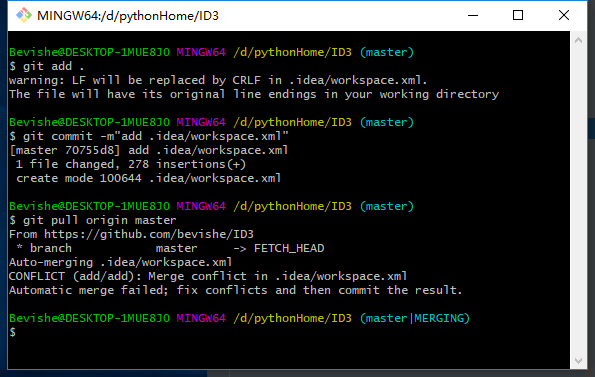
An example use case for this could be when you want to clean out a folder that contains build artifacts. In some situations, you might also - in addition to untracked files - want to delete any ignored files. If you want to include them, you can use the "-d" flag: $ git clean -fd

If you want to only delete untracked files in a certain subdirectory of your project, you can additionally specify a path: $ git clean -f folder/subfolderīy default, folders themselves will no be deleted. To actually allow git clean to delete files in your working copy, you'll have to use the "force" option: $ git clean -f If this looks correct, you can proceed without the safety catch. Run the git clean -f command twice if a different repo manages the untracked directory whose files you want to remove from git. "Dry run" means that Git will not actually perform any deletions, but it only tells you which files would be deleted. This is why the first step when approaching git clean is to make use of its "dry run" functionality using the "-n" flag: $ git clean -n Whatever options and parameters you provide: using git clean will only affect untracked files - in our example img/iconFacebook.png and login.html - and leave anything else untouched.īefore you use git clean to delete untracked files, you should remember an important detail: untracked files, by definition, aren't included in version control - and this means that when you delete them, you will not be able to restore them!

" to discard changes in working directory) Let's take a look at an example scenario: $ git status To get rid of new / untracked files, you'll have to use git clean! Usage Examples and Options files that already are under version control). git reset -hard is a classic command in this situation - but it will only discard changes in tracked files (i.e. Scope We will discuss untracked files and their types. gitignore, or we can add them to git stash and recover them when required. We can delete these using the git clean command, we can ask Git to ignore them using. Let's say you've programmed yourself into a dead end and want to start over, with a clean working copy. There are multiple ways to remove untracked files Git. If you really need this file in master, then add it to Git. To remedy this, you can simply delete this file, then do the checkout.
GIT UNTRACKED FILES REMOVE SERIES
(Take a look at our First Aid Kit video series for other commands and workflows to undo mistakes.)Ĭompared to reset or revert, which are also classic undo commands, git clean is different: it targets untracked files that haven't been added to version control, yet. The problem is with an untracked file, which is not managed by Git, so it therefore should come as no surprise that Git commands have no effect. The clean command is one of Git's many "undo" tools. The -raw output used to be obtained by git whatchanged, back in the early days of Git, and it's actually still one of the styles I prefer.How to remove untracked files with git clean

It won't hurt to check, but usually it's easier to check with git log -name-status or git log -raw. If you have not been deliberately adjusting Git's index as you work, though, the fact that they're not in the index now is usually enough of an indicator that you don't need to check. (You can inspect the complete set of files in any given commit using git ls-tree -r: supply an identifier for that commit, e.g., a branch name like master, or a branch name with a relative suffix, like master~2, or a raw hash ID. So if those files aren't in Git's index now, they probably weren't in Git's index earlier, and hence will not be in any earlier-made commits either. Git makes new commits from its index, not from your work-tree. Commits of course contain files, so whatever files are in the commits that go in, are in-but an untracked file is by definition a file that is not currently in Git's index. The git push command pushes commits, not files.


 0 kommentar(er)
0 kommentar(er)
